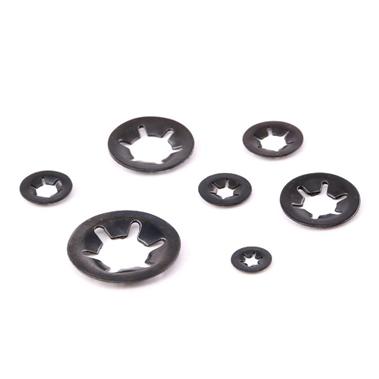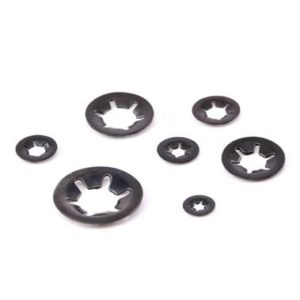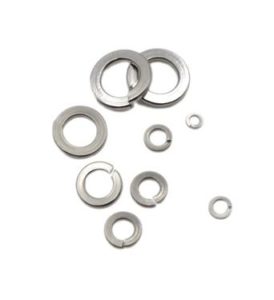Lock Washer Vs Split Washer, Which One Has More Teeth?
What type of locking washer is ideal for locking bolts in place? In this Lock washer vs split washer review, we explain why a teethed washer might be what you need.
I repair motorcycles in my back garage. A lot of my biker friends bring their bikes over for minimal repairs or complete makeovers. A common problem I see in most motorcycles is loose nuts and bolts. Bolts would loosen around the gearbox causing problems in shifting. A friend of mine once rode to my place only to realize the number plate was missing. washers help me fix many of these problems. I discovered that lock and split washers do a better job in maintaining the integrity of joints. I have compared these two washers overtime and developed a preference. My hope is that by the end of this review you will have made an informed decision.
Lock Washer and Split Washer-How Do They Compare?
| Lock Washer | Split Washer | |
| Finish | Black | Silver |
| Quantity | 280 | 370 |
| Material | Metal Steel | Stainless Steel |
| Check the price | Check price |
Lock Washer Vs Split Washer- A Detailed Comparison
Finish
The finish of the fastener does not matter much to me since I can always repaint it. On days I do not feel up to a paint job, a little shortcut would be nice. The lock washers I use come in black which is ideal if I am working on a bike with a similar or complementary color. Most bikes have silver colored bolts and nuts. The split washers I use already come in silver which is a plus.
Quantity
For someone who works with bikes a lot, I have no time to keep rushing to the local store for supplies. I buy my washers in bulk to save me the trouble. A pack of lock washers from Hitilchi brand has over 280 washer pieces. Split washers from HVAZI brand contains over 370 pieces. If quantity is a deciding factor for you, then the split washers have more value for money.
Material
Standard washers feature a steel construction for durability. Both fasteners come in a steel construction which increases their longevity. The only difference is that the lock washers are pure steel with a metal oxide finish. If the black coating wears off, the washers are vulnerable to rust. Split washers have a stainless steel body which makes them rustproof. If you are working with equipment in a moist environment, then you are better off with the split washers.
Functionality
Between a lock washer and a split washer, which one does its job better? To know this, we have to look at the lock mechanism on the washers. Hitilchi lock washers have multiple teeth on the inside of the washer. These teeth face downwards to bite into the surface of a joint. It prevents bolts from rotating and loosening during high vibration
Split washers have split raised end. The raised ends lock the bolt and surface in place. It prevents the bolt head from rotating and loosening.
Working with both fasteners, I can say they are both functional. It all boils down to personal preference. As long as you do not flatten the teeth or split ends, the washer will work fine.
Lock washer
Hitilchi lock washers are handy when tightening nuts and bolts. They have inner teeth that face downwards. This allows the washer to grab on the bolt head and joining surface. The established grip prevents bolts from spinning and loosening.
Hitlchistarlock washers come in a convenient pack with 280 pieces. This is enough to last you through a DIY project at home. If you run a business like mine, it will be a while before you restock on lock washers.
All lock washers boast of a steel body which makes them durable. The strong body also ensures the washer locks onto the bolt head preventing it from turning. The metal oxide coating prevents the washers from developing rust or getting corroded.
Pros
- Sleek black finish
- Enough washers to last a project
- Has internal teeth to lock onto bolt and surface
Cons
- Prone to rust if coat wears off
Split washer
Split washers are the go to fasteners for most home and commercial assembly projects. They contain split ends that lock the bolt in place preventing it from moving. This is an advantage if you are securing joints that are constantly exposed to high vibration.
This product from HVAZI comes in an assorted box containing 370 washers. They feature a stainless steel coating that protects the washers from rust or corrosion. This coating also withstands magnetic fields ensuring your bolts remain intact.
HVAZI split washers come in a variety of sizes. Whether you are working on small or large bolt heads, these washers come in handy on both occasions. The split ends have a spring force that prevents bolt heads and nuts from loosening. Split washers are also ideal for use in heavy duty projects.
Pros
- Strong and durable
- Resistant to rust and corrosion
- Enough washers to work with
Cons
- No color variety
Conclusion
To wind up this lock washer vs split washer review, my money is on the split washers. They are rust proof and strong enough for the heavy bolts and nuts. I also appreciate the assorted pack with lots of washers to work with.
FAQ
Do you use a lock washer before a flat washer?
Flat washers can go on either the bolt side or the nut side. Lock washers will only go on the bolt side if they have teeth or split ends.
Are lock and split washers necessary?
Washers serve the function of holding bolts and nuts steady preventing them from loosening. Some lock washers include internal teeth or serrated surfaces. This provides a large surface area for binding with bolt and joining area.
Which side of the internal tooth lock washers goes down?
Internal tooth lock washer has two types of teeth. The teeth can face downwards which is the side that faces the bolt. Tooth lock washers also have serrated surfaces. When paired, the two surfaces lock onto each other creating a strong bond.
Can you reuse lock washers and split washers?
Lock washers and split washers are completely reusable. If well-maintained, you can recycle them.



